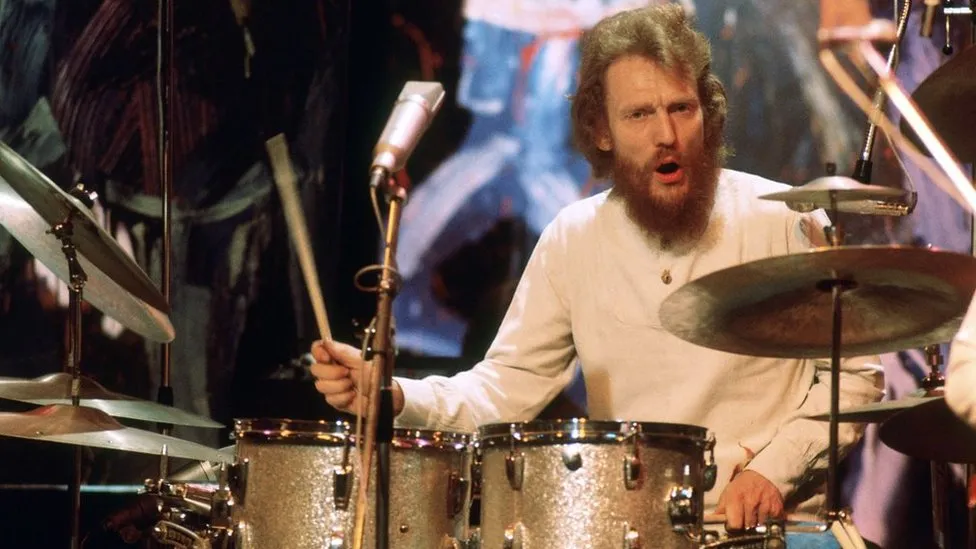Cream made a strong impression at the Windsor Festival in England when they performed their high-powered blues influenced covers and original material. All three members demonstrated tremendous solo improvisation abilities. Audiences were stunned at how they could combine jazz influenced improvisation with a commitment to the blues, and yet create a rock style with catchy melodies. Cream was finding a unique musical direction because the power trio was a new concept and much different than the usual quartet or larger ensemble. Clapton explained, “In a trio I had to provide a lot more of the sound, and I found that difficult because I didn’t really enjoy having to play so much. My technique altered quite a lot in that I started playing a lot more bar chords and hitting open strings to provide a kind of drone for my lead work.”
Ginger Baker as an innovative drumset soloist with a flair for exciting and long drum solos. He played a lot of solo ideas on his tom-toms that drew from earlier big band drummers such as Gene Krupa and Louie Bellson. Baker was also innovative with his use of rudiments and his ability to develop drumset parts that utilized the full drumset. This gave Cream even more explosive power to help realize their definition of what a rock power trio was all about. Baker’s drumset parts were always musical as he really listened to the riffs and solos generated by Eric Clapton and Jack Bruce.
“Sunshine of Your Love”
written by Eric Clapton, Pete Brown, and Jack Bruce
“Sunshine of Your Love” was recorded and released on Cream’s Disraeli Gears album in 1967. This song was based around a strong bass riff which functioned as a repeating melodic idea. This riff allowed the guitar and vocals to improvise around a constant structure and at the same time create a hypnotic effect. Jack Bruce was inspired after he saw Jimi Hendrix play live for the first time. Bruce went home and came up with this famous blues-derived riff that came from a minor pentatonic scale with a flatted fifth. It wasn’t until Ginger Baker slowed the tempo down in the studio and played a heavy tom-tom pattern, that all the parts came together.
The lyrics were written by a beat poet named Pete Brown, who was a friend of both Ginger Baker and Jack Bruce. Brown wrote the lyric “It’s getting near dawn, when lights close their tired eyes,” after being up all night and seeing the sun rise. Atlantic Records executive Ahmet Ertegun brought in producer and musician Felix Pappalardi (bassist and vocalist of the band Mountain) for the session, who helped to arrange many of Cream’s tunes. Pappalardi went on to produce Cream’s 1968 Wheels of Fire and 1969’s Goodbye albums. In America, “Sunshine of Your Love” was one of the biggest selling singles in 1968. “Sunshine of Your Love” is still one of Eric Clapton’s favorite songs and he continues to play it at many of his live performances.
____
Cream was more successful in America than in their native England. However, the stress of constant touring and the self-imposed pressure they placed on themselves, created tension within the band. Many believed that the personal issues between Jack Bruce and Ginger Baker were the demise of the band. This was a factor, but Clapton felt that Cream was forgetting the principles that first brought them together. Clapton remembered, “There were times, too, when playing to audiences who were only too happy to worship us, where complacency set in. I began to be quite ashamed of being in Cream, because I thought it was a con. It wasn’t really developing from where we were. As we made our voyage across America, we were being exposed to extremely strong and powerful influences, with jazz and rock ‘n’ roll that was growing up around us, and it seemed that we weren’t learning from it.” Clapton was also comparing Cream to other bands such as The Band, who had just released their groundbreaking album Music from Big Pink. Clapton was feeling trapped and uninspired because he felt Cream was just showing off their individual skills on their gigs. Cream disbanded in 1968, but have reunited occasionally. Cream was inducted into the Rock and Roll Hall of Fame in 1993.
